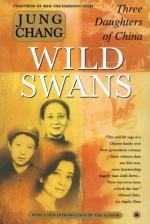
|
| Name: _________________________ | Period: ___________________ |
This test consists of 15 multiple choice questions and 5 short answer questions.
Multiple Choice Questions
1. What happens with the newspapers before the revolution that confirm Mao's concern that he is losing power?
(a) A new column is placed that questions certain leaders.
(b) An article Mao wrote is not published immediately.
(c) An anonymous article is written against him.
(d) Some old Kuomintang officers are allowed to work there.
2. Who is sent to bring De-hong home from Peking?
(a) Jung Chang.
(b) Yu-Fang.
(c) General Xue.
(d) Wang Yu.
3. What does De-hong do to get Xiao-hong permission to come to Chengdu with her husband?
(a) She takes on a lowly job in a factory to prove her loyalty to the party.
(b) She pays a hefty fine to the government.
(c) She has her husband declare that he is willing to go into rehabilitation.
(d) She has a doctor declare that Xiao-hong has an incurable disease.
4. Who allowed Mao's wife to gain so much power?
(a) Her brother.
(b) Her father.
(c) The Tings.
(d) Mao.
5. Why was De-hong allowed to leave prison for a short time?
(a) To testify in behalf of her husband.
(b) To sit with her mother in her dying moments.
(c) To help with the rice harvest.
(d) To care for Jung while she was sick.
6. What does her hatred of capitalism keep Jung from doing while in Peking?
(a) Selling her belongings for food.
(b) Promoting her father's business.
(c) Purchasing anything--even food.
(d) Taking a job with wages.
7. How is Jung able to come back to Chengdu when she thought she would be stuck at the work farm?
(a) De-hong has a factory friend request that she work there.
(b) She is cleared of all wrongdoing.
(c) She pays a hefty fine.
(d) Her rebel father dies.
8. What are people labeled when their loyalty to the Communist cause is questioned?
(a) White or Gray.
(b) Gray or Black.
(c) Yellow or Red.
(d) Blue or Brown.
9. What took the doctor so long to attend to Chang Shou-yu before he died?
(a) There was terrible traffic on his way there.
(b) The doctor did not approve of Chang Shou-yu.
(c) He forgot his equipment and had to go back for it.
(d) He was busy with a tuberculosis epidemic.
10. What job does Xiao-hei take in hopes of being seen favorably by the party after his father's political position is threatened?
(a) Factory consultant.
(b) Air Force cfficer.
(c) Caring for swine.
(d) Teacher.
11. What causes Jung to reflect on Mao's unfair treatment of the people while on vacation with her sister?
(a) A picture of oneof his vacation homes.
(b) She watches an uncle die of starvation.
(c) She reads an article in Newsweek.
(d) She sees him beat a poor farmer.
12. Of what is Mao afraid?
(a) His power being threatened.
(b) Kuomintang officers killing him.
(c) A yellow fever epidemic.
(d) Communism failing.
13. How are most of the young people feeling during the political unrest and the famine?
(a) Defensive and suspicious.
(b) Confident and strong.
(c) Confused and concerned.
(d) Brave and true,
14. What does Jung want to spend every spare moment doing while she is at the work farm?
(a) Reading.
(b) Talking.
(c) Eating.
(d) Sleeping.
15. From what does Chang Shou-yu suffer when he gets home from Peking after his incarceration?
(a) Yellow fever
(b) Pneumonia
(c) Schizophrenia
(d) Tuberculosis
Short Answer Questions
1. What does the Tings' fall from grace mean for the people?
2. What is the name that Mao gave his group of young followers?
3. Why do the students finally let De-hong on the train?
4. Why does Jung have to rush to get back on a train during her trip to Peking?
5. What happens to Jun-ying that causes her to be unable to care for Xiao-fang?
|
This section contains 691 words (approx. 3 pages at 300 words per page) |

|




